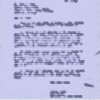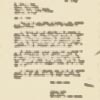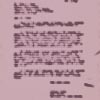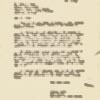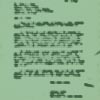1899 North Carolina Literacy Test Requirement
Annotation
Although African Americans won the right to vote with the fifteenth amendment in 1870, their gains were quickly eroded, especially after the end of Reconstruction in 1877. Indeed, exclusionary policies got worse in the late nineteenth century and Southern states developed policies to stop African Americans from voting. In 1899, for example, the North Carolina legislature passed an amendment requiring a literacy test for voting. In order to not disfranchise illiterate white men, a so-called "grandfather" clause stated that anyone whose father or grandfather could vote prior to 1867 (when there were no black voters) would be exempt from the literacy test. Moreover, those African Americans who tried to vote confronted racist polling officials who would ask questions about the state constitution that even legal experts could not answer.
Public Laws of North Carolina, 1899, chapter 218.
(Sec. 4.) Every person presenting himself for registration shall be able to read and write any section of the constitution in the English language and before he shall be entitled to vote he shall have paid on or before the first day of March of the year in which he proposes to vote his poll tax as prescribed by law for the previous year. Poll taxes shall be a lien only on assessed property and no process shall issue to enforce the collection of the same except against assessed property.
(Sec. 5.) No male person who was on January one, eighteen hundred and sixty-seven, or at any time prior thereto entitled to vote under the laws of any states in the United States wherein he then resided, and no lineal descendant of any such person, shall be denied the right to register and vote at any election in this state by reason of his failure to possess the educational qualification prescribed in section four of this article: Provided, he shall have registered in accordance with the terms of this section prior to December one, nineteen hundred and eight. The general assembly shall provide for a permanent record of all persons who register under this section on or before November first, nineteen hundred and eight: and all such persons shall be entitled to register and vote in all elections by the people in this state unless disqualified under section two of this article: Provided, such persons shall have paid their poll tax as requ[i]red by law.
Source
Paul D. Escott and David R. Goldfield, Major Problems in the History of the American South, Vol. 2, The New South (Lexington, Mass.: D.C. Heath and Company, 1990), 179.
